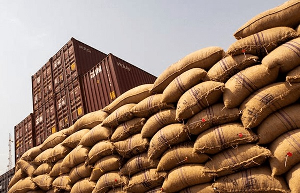The Volta Lake Transport Company Limited (VLTC) has called on businesses in Ghana to take advantage and cart bulk quantities of their cargoes across the Volta Lake because it is safer, and cost-efficient to do so, compared to road transport.
Speaking on the Eye on Port program on maximizing the benefits of Inland Water Transport, the Managing Director of VLTC, Rose Appiah Okyere said the company has the full complement of equipment and human resource to support the logistics needs of companies who want to convey goods between the Southern and Northern parts of Ghana. The company has at its disposal 3 barges of 2,250 ton-capacity dedicated to shipping of solid bulk cargo and 6 barges with a total capacity of 4,676 tons.
Mrs. Okyere said, “we have the capacity. We have two tug boats which ply the North-South commercial route and one tug boat per voyage could pull 9 barges at a go which is equivalent to 100 Bulk Road Vehicles (BRVs) of about 54,000 litres of liquid cargo capacity and 48 trucks of 1000 bags of cement capacity.”
“It is 40% cheaper than by road. Per one voyage about 140 trucks will be moved from the road, meaning in a year over 2000 trucks will be moved off our roads, and that will free our roads and help us conserve them and reduce the amounts of money we use to rehabilitate these roads, as a nation,” she continued.
She also urged government to look into the possibility of influencing cargo volumes through the lake.
“I believe there is a policy to direct some 30-40% of cargo earmarked for the north should be channeled through the lake.”
The VLTC Boss said the company’s North Bound Commercial Line from Akosombo to Buipe is capable of recording 150,000 to 160,000 tons per year, yet they are turning around only 26% of the total annual capacity.
As a result, the VLTC Boss disclosed that the company seeks to embark on a vigorous marketing strategy to increase awareness and patronage of the once-vibrant company.
She said the company, established in 1970 by the state following the construction of the Hydroelectric Dam in Akosombo, has been experiencing diminishing levels of cargo volumes, attributing this to the seeming preference of local companies to transport by road.
Mrs. Okyere disclosed that in its solid bulk category of goods, VTLC only ships for GHACEM currently, and in its liquid bulk category, transports for the Bulk Storage and Transportation Company (BOST). Hence, she called on Ghanaians to tap into the advantages inland water transport presents.
She explained that by its commercial line significantly boosted by increased patronage, the company will be able to recapitalize as well as find enough funds to subsidize its ferry operations.
Business News of Friday, 17 March 2023
Source: Eye on Port













